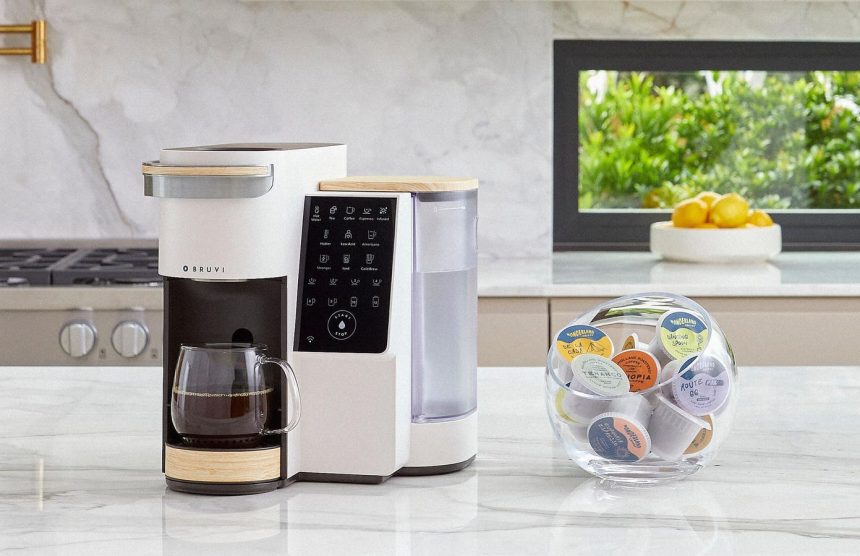A year ago, Mel Elias, the former CEO of Coffee Bean & Tea Leaf, a popular coffee chain throughout the US, launched his latest venture, Bruvi.
He, alongside co-founder Sung Ho, wants to take on the biggest single serve coffee brand in the world, Keurig, which he says has over 90% of the market share when it come to single serve machines used at home to brew up coffee.
But it’s not his first time trying this venture. While at Coffee Bean & Tea Leaf, Elias saw that there was room in the market for another brand — one that he says looks more closely at the quality of coffee and its footprint. This, though, was in 2011 and direct-to-consumer companies on the Internet were still getting their footing. Meanwhile, working with big box retailers was challenging, and costly. So it didn’t quite take off.
“During my tenure at Coffee Bean, we launched a single service system that we licensed out of Europe. And it was just the wrong time and wrong product. But during that whole expansion, I learned so much about single serve, and you know, what consumers want and what they don’t, and how the whole system operates,” he says.
That iteration only produced espresso-based drinks. Americans, he learned, like a larger cup of coffee so the product needed tweaking.
So when he was able to jump back in with a new design, he made a lot of improvements. And over the years, the interest and demand for single serve coffee is just increasing he says. “In the last five years, single serve has increased by 50%, and it literally represents 50% of every coffee item you buy in retail. Americans, and the world, love the convenience, the affordability, and the ease of these machines.”
Plus during the pandemic, many folks invested in at-home coffee machines to enjoy a better cup of coffee while working from home. Elias notes that single serve machines overtook the sale of regular coffee machines in 2020, selling more than 11 million units in the US alone.
However, all of this has a downside: more than 71 billion capsules of coffee are consumed every year. America, uses about 22 billion itself, he says. And much of that waste is not being recycled or disposed of properly. While many of the capsules sold on the market are touted as being recyclable, they are not in fact being recycled.
So Elias has found a different solution: using enzymes to break down their capsules. This is not new tech. In 2016, Japanese researchers found that certain bacteria could help break down plastics. And since, there have been multiple different studies looking at different types of enzymes that could help reduce plastic waste in landfills.
“Actually, it’s really quite bizarre how simple the solution is, and how incredible the combination of political convenience and strong lobbying and how people don’t adopt the solution,” says Elias.
So Bruvi has added an enzyme to the pod that makes it feasible to break down the plastic in landfill. That means Bruvi is actually encouraging customers to throw the pods in the trash — not in recycling. Recycling, Elias explains, doesn’t work for a myriad of reasons: from clogging up recycling machines, pods being dirty, and recycling varying from region to region.
Instead, he’s more intrigued by the existing landfill network. Modern managed landfills, he says, have to follow certain procedures and protocols that require them to cover waste with top soil, prevent local water systems from being contaminated, and have gas collection systems. Forty percent of the more than 1200 landfills in American (which he notes, 80% are managed by three companies) actually have gas-to-energy projects that convert methane emissions to clean energy. “That exists today—already!” he iterates.
The Bruvi capsule works only in anaerobic environments — thus it doesn’t break down until it’s covered with soil or waste matter. And according to tests run by Bruvi, 70% of the capsule broke down in 2 years, and doesn’t leave behind microplastics once fully decomposed. Assuming that the landfill it was in has a gas-to-energy project, it can be argued that the capsule didn’t create waste but was part of a cycle used to capture renewable energy.
Elias goes on to make one more clarification: “The Association of Plastic Recycling has deemed that if anyone puts enzymes in a plastic, it is not capable of being recycled. Then, it has to go through a critical design test.”
Thus, even though the capsule is made of 100% polypropylene, Elias says that it’s more suited for landfill due to the enzymes added than the recycling route.
“But [this innovation] is not exclusive to Bruvi,” he adds. “Any plastic manufacturer can do this by adding an enzyme to the plastic. But the messaging on this is hard. It goes in the landfill?! That’s not a good word these days. Yet, yogurt cups, other capsules, apple sauce containers. There’s countless CPG products that this would be perfect for. That’s why we want other companies to be excited by this, and take a note from Bruvi to consider this.”
He’s hoping that as people see Bruvi take the lead on this, bringing it to market in a product that consumers use everyday, it could push lobbying organizations and recycling authorities to rethink their approach on plastics. Given that no solution is perfect at the moment, and he notes that compostable packaging has its own challenges, companies need to explore all avenues — including ones that may not be perfect — as they work to be more eco-friendly.
This, though, is not an excuse to use more plastic all around, he clarifies. For instance, Bruvi ships their machines in plastic-free packaging, using a cotton tote to keep the machine scratch-free in transit. The paper-based packaging is limited, and only where needed.
Yet, the pods, he says, need to deliver on freshness, ease-of-use, and function well within the machine. Right now, he argues that plastic does that best. So the emphasis for him is on how to reduce plastic’s footprint in landfills.
Could this solution be of one of several companies employ in the coming years as packaging materials develop and improve? He’s betting on it. And for those who still want to opt out of single-use pods, there is a reusable pod that Bruvi now offers.
Read the full article here









